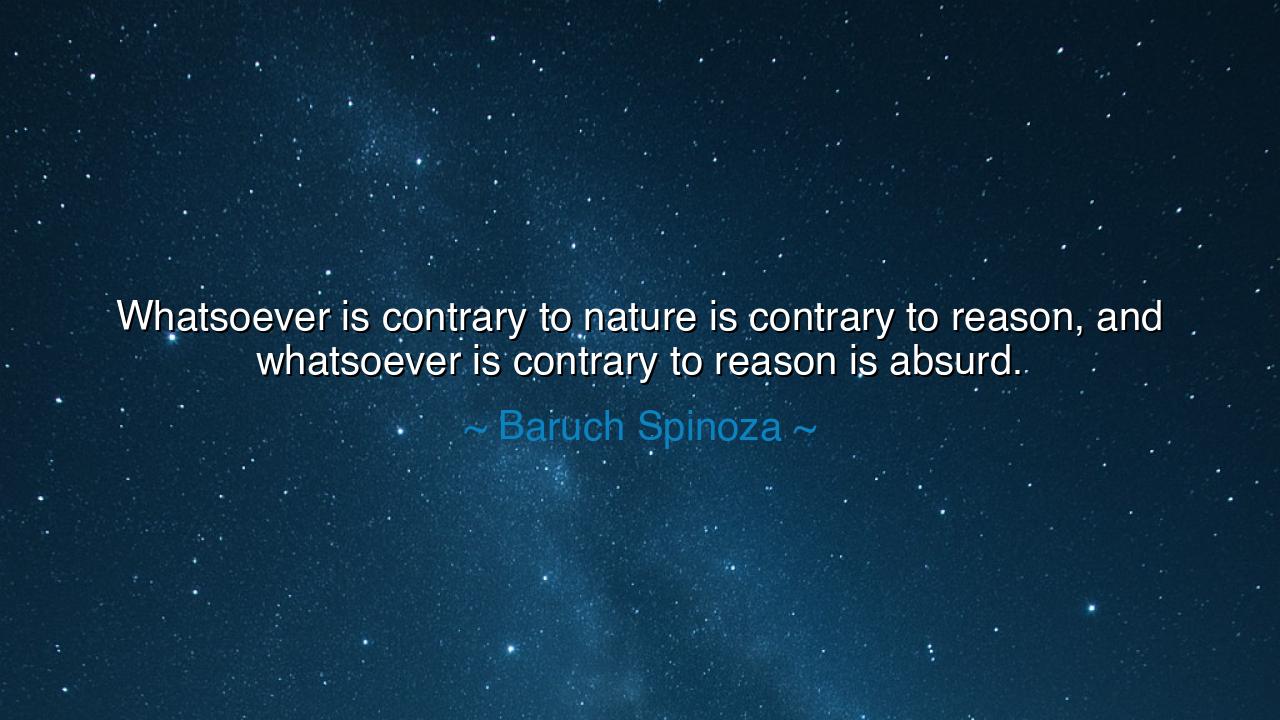
Whatsoever is contrary to nature is contrary to reason, and
Whatsoever is contrary to nature is contrary to reason, and whatsoever is contrary to reason is absurd.






In the solemn wisdom of Baruch Spinoza, the philosopher who sought to unite the divine, the natural, and the rational, we are given a truth both austere and liberating: “Whatsoever is contrary to nature is contrary to reason, and whatsoever is contrary to reason is absurd.” These words are not idle speculation, but the fruit of a mind that saw the harmony of the universe as one unbreakable order. To him, the laws of nature were not obstacles to human freedom, but the very foundation of truth itself. To rebel against them is to rebel against reality; to rebel against reality is to sink into absurdity.
For Spinoza, nature is not merely trees and rivers, but the totality of existence, the divine order of all things. He called it Deus sive Natura—God or Nature. This was his radical claim: that God is not beyond the world but is the world itself, expressed in infinite forms. If this is true, then to act against nature is to act against God, against truth, against the very fabric of being. Such rebellion cannot succeed; it collapses under its own impossibility, dissolving into contradiction and chaos.
So too did Spinoza bind reason to nature. For him, the human mind is not a thing apart from the natural order but a part of it, reflecting its laws as light reflects the sun. Reason, therefore, is nothing more than the recognition of natural truth. To use reason rightly is to align oneself with reality; to ignore reason is to walk in darkness. Thus he declares: what is contrary to reason is also contrary to nature, for the two are not enemies but allies, both servants of the same order.
History itself has shown the folly of ignoring this unity. Consider the fall of the Roman Empire, when emperors drowned themselves in excess, believing they could defy the natural laws of moderation, justice, and civic duty. Their decline was not punishment from above, but consequence from within. Or reflect on the Age of Enlightenment, when men like Galileo and Newton, aligning reason with the laws of nature, unveiled truths that transformed the world. Their wisdom flowed from harmony with nature, while those who denied it—condemning the telescope, mocking gravity—were revealed as the truly absurd.
The meaning of Spinoza’s teaching, then, is clear: to live wisely, we must live in harmony with both nature and reason. If we deny the rhythms of life—the need for rest, the inevitability of death, the interdependence of creatures—we invite ruin. If we scorn the voice of reason—ignoring logic, evidence, and truth—we fall into folly and delusion. But if we unite the two, embracing the natural order with a rational mind, then we walk in clarity, and our lives acquire strength, peace, and purpose.
The lesson for us is profound. Do not strive to bend reality to your desires; instead, bend your desires to reality. Seek to understand the laws of the world and of your own soul, and align your actions with them. Live according to truth, not fantasy; according to wisdom, not impulse. For if you resist nature, you will break; if you resist reason, you will wander lost; but if you follow them both, you will find the path of harmony.
In practice, this means cultivating humility and discipline. Listen to the rhythms of your body and the patterns of the earth. Honor the truths uncovered by science and the insights gifted by philosophy. When passions cloud your vision, let reason be your guide; when pride tempts you to think yourself above the order of life, let nature humble you. In this way, you will not only avoid absurdity, but find yourself living in alignment with the eternal order that Spinoza called divine.
Thus the words of Spinoza stand like a pillar of stone: “Whatsoever is contrary to nature is contrary to reason, and whatsoever is contrary to reason is absurd.” Let them guide us as both warning and compass. For in a world often drowning in noise and illusion, the way of truth remains unchanged: live according to nature, listen to reason, and walk far from the abyss of the absurd.






AAdministratorAdministrator
Welcome, honored guests. Please leave a comment, we will respond soon